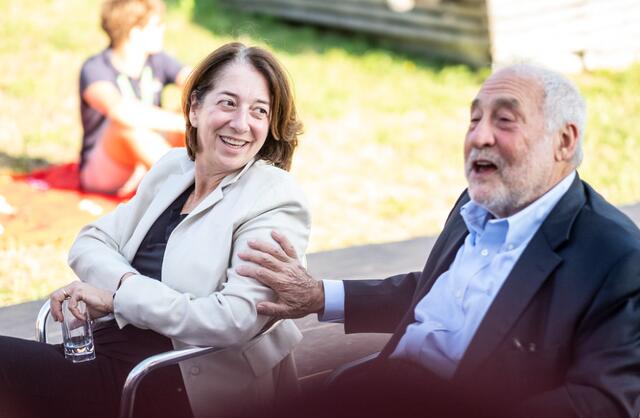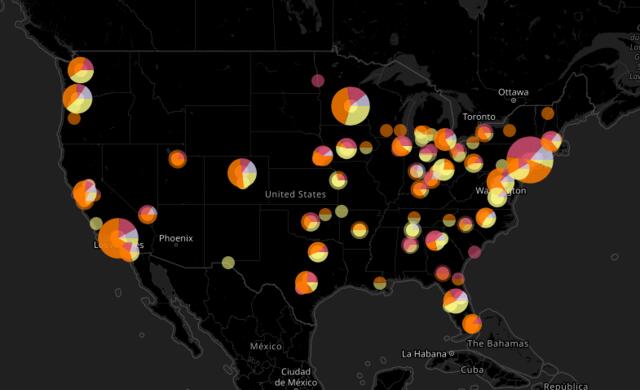
Specialization Spotlight: Technology, Media, and Communications
Last semester, I was in a course taught by a professor who also teaches at the London School of Economics and leads the European Parliamentary Research Service. He described Columbia as one of the most cutting edge institutions in the world.
At SIPA, that is manifested in a number of ways. At least in my experience, that is especially the case within the Technology, Media, and Communications (TMaC) specialization. I caught up with the director of the specialization and Columbia alumna Professor Anya Schiffrin to talk about what makes TMaC so special.

The first thing to know about TMaC is that it is constantly evolving. Course offerings vary each semester, and the specialization offers a remarkable number of “short courses,” 1.5-credit modules which span half of the semester. This allows students to explore a variety of subjects and ensure that we are always exploring the most relevant issues.
“TMaC was teaching social media and internet governance 10 years ago,” says Professor Schiffrin. While there is much more interest in those areas today, TMaC is moving to the next big thing. For example, one course I took last year on internet business models was meant to become a course about crypto next year, but was instead made into a course about artificial intelligence before it even began.
Students certainly have the opportunity to build foundational knowledge in courses such as Professor Schiffrin’s “Solutions to Online Mis/Disinformation” and “Global Media: Innovation & Economic Development.” These courses are complemented by outside activities, such as the “Saving Journalism” conference which was held for the second semester in a row earlier this month.
One factor that makes TMaC different from technology and media programs at peer institutions is its focus on rights and advocacy. Whereas other programs tend to focus almost exclusively on cybersecurity, TMaC examines the impact of technology on institutions and society, always from a policy lens and with the purpose of proposing and studying solutions.
This semester, I am taking a course called “Crowdsourced Storytelling,” which examines the impact of user-generated content on media reports and government policymaking. In class, we have been learning methods by which to verify the authenticity of videos posted online and studying emerging technologies which may strengthen (or weaken!) our ability to verify online content.
The class is taught by Erica Berenstein and Mounir Ibrahim, who were classmates at SIPA a little over a decade ago. Professor Schiffrin described the class as “experimental” and “at the cutting edge of policy,” and I have to agree. Our guest speakers have hailed from organizations such as The New York Times and Bellingcat, and some of their recent accomplishments include uncovering that a U.S. drone strike in Afghanistan killed the wrong person, analyzing behavioral patterns in the Iran protests, and documenting police violence against protesters in the United States.

For my own final project, I will be analyzing a handful of videos to establish the impact of online content on Venezuelan migrants crossing the Darien Gap in order to claim asylum in the United States. The course has challenged me in ways that I haven’t been before, but after each class and after I turn in each assignment I am left in awe of everything I just learned and everything there is yet to know. This is the kind of academic experience that, simply put, does not and could not occur anywhere else.
Despite not being a concentration, TMaC is so impactful that many alumni go on to work in fields where their skills and knowledge is mostly derived from their time in TMaC. The most popular fields, according to Professor Schiffrin, are international organizations, governments, big tech, journalism, and think tanks.
I will mention one last thing that makes TMaC incredibly special, and that is Professor Schiffrin herself. She frequently hosts lectures for admitted students, and I attended the two that she hosted when I was considering SIPA. I asked a question during the first one, and when I joined the second one a month later, she welcomed me by name. The same thing happened when I walked into her classroom on the first day of class. Professor Schiffrin frequently hosts gatherings at her home and is extremely proactive in sharing internship or job opportunities based on students’ individual interests. She is an exceptional educator and a leader in the field; a true powerhouse.
TMaC is simultaneously one of SIPA’s crown jewels and one of its best kept secrets. If you are thinking about a TMaC specialization, I cannot recommend it enough.